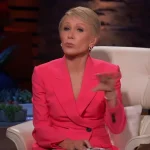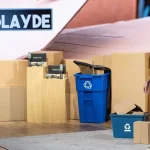
When most investors talk about risk, they mean taking bold chances on innovation, startups, or emerging technology. But Robert Herjavec, one of Shark Tank’s most respected mentors, recently revealed a very different answer when asked where he’d invest his last million dollars.
According to Herjavec, if he were stripped down to his final funds, he’d put every penny into real estate — not the stock market, not crypto, not AI — but tangible, long-term property.
In the 10x Growth Conference, Grant Cardone asked him if he was left with the last few million dollars, where would he invest? Herjavec explained that real estate is, in his words, “the best way to build a stable foundation for future success.”
Let’s unpack why the cybersecurity mogul and seasoned investor believes real estate remains the safest, smartest, and most dependable investment — even in a fast-changing digital world.
The Mindset Behind the Million-Dollar Bet
Robert Herjavec’s perspective comes from decades of building, scaling, and investing in businesses that live or die by risk management. His logic is rooted in something simple yet profound. When everything else fails, stability matters instead of speculation.
Robert shared a story in a 2023 LinkedIn post about what he calls the worst investment. It was a breathalyzer company, but after some time, it came under investigation by the U.S Food and Drug Administration.
In the conference interview, Herjavec stated that while startups, or tech ventures, can yield high returns, they are also vulnerable. Real estate, however, offers one thing every entrepreneur and investor ultimately craves — control.
Even if valuations fluctuate, real estate usually recovers — because, unlike other assets, it meets a fundamental human need: shelter.
Why Real Estate Wins Over Startups
Robert Herjavec is famous for funding fast-growth startups on Shark Tank. His stance on real estate reveals the difference between the logic behind venture capital and personal financial survival.
Let’s break down the comparison:
| Factors | Startups | Real Estate |
|---|---|---|
| Risk | Extremely high (most fail within 3 years) | Moderate (long-term appreciation likely) |
| Liquidity | Low; exit depends on the market or acquisition | Low, but stable asset value |
| Control | Limited after funding a team | Direct ownership and management are possible |
| Returns | Potentially 10x or more, but rare | Steady cash flow, appreciation, and tax benefits |
| Stress level | High; reliant on founders and execution | Lower; predictable if managed well |
Herjavec’s bet isn’t anti-entrepreneurial — it’s foundational. He believes real estate provides the kind of baseline security that allows entrepreneurs to take bigger, smarter risks later.
Real Estate as the “Foundation of Freedom”
Robert Herjavec immigrated from Croatia to Canada as a child. Hence, in the communication with Grant Cardone, he mentioned: “If I am down to my last million, you know what I have got to do? I have got to build a foundation.”
That’s what makes real estate, in his mind, the ultimate freedom asset. When you own property:
- You can live in it.
- You can rent it out for income.
- You can leverage it to raise capital for other ventures.
- You can pass it down as legacy wealth.
Property investments build stability and intergenerational security.
Is Real Estate Still a Safe Bet?
Some people might wonder whether this advice holds up in today’s era, given increasing housing prices, high interest rates, and inflation. But Herjavec’s view isn’t about timing the market — it’s about understanding value over volatility.
He’s essentially saying:
- You can’t control market cycles.
- You can control what you buy, how you manage it, and how you use it.
As per the report by JM Financial, real estate grows by 6% to 9% on an annual basis. This aligns with Robert’s point of investing in real estate as a dependable long-term passive income offering stability.
However, even though mortgage rates increase, property retains intrinsic value, primarily in high-demand cities and demographics, along with long-term population growth. Moreover, in times of uncertainty, hard assets like land often tend to outperform speculative investments.
Lessons for Entrepreneurs
Herjavec’s perspective offers more than just investment advice — it’s a business lesson in disguise. Here’s what Shark Tank founders and everyday entrepreneurs can learn from his approach:
1. Build your safety net first
Before scaling a risky business, ensure you have stable assets or income streams that protect you from total collapse.
2. Think long-term
Businesses can rise fast and fall faster, but real wealth is built by owning appreciating assets that outlast market trends.
3. Diversify with purpose
Don’t chase every hot trend. Build a diversified portfolio anchored in something predictable — property, land, or even commercial space for your own business.
4. Use real estate to support entrepreneurship
Owning your office or warehouse can reduce operational costs, protect against rent hikes, and improve cash flow.
Why Sharks Like Robert Play the Long Game
Shark Tank often glamorizes “the next big thing” — from AI to eco-products to social apps. But off-camera, Sharks like Robert, Barbara Corcoran, and even Mark Cuban consistently emphasize one principle: cash flow and real assets win in the long run.
Corcoran famously made her fortune in real estate before becoming a TV personality. Herjavec, despite his roots in tech and cybersecurity, still praises real estate. As it is the ultimate “button” for entrepreneurs, that way they can build even after a setback.
The reason? Predictability.
Startups depend on innovation. Real estate depends on population, location, and time — far more measurable factors.
Herjavec’s stance underscores a truth that most successful investors eventually realize: you can’t gamble your way to financial freedom; you can only build it, one brick at a time.
How to Follow Robert’s Real Estate Philosophy?
If you want to think like Robert Herjavec, here’s how to start applying his mindset — whether you have $1,000 or $1 million to your name:
- Start small: Buy your first home, duplex, or small rental unit. Don’t wait for the “perfect” property.
- Invest in what you understand: Research local markets. Look for areas with strong job growth, infrastructure, and low vacancy rates.
- Think of cash flow before appreciation: The best investments pay you monthly — not just when you sell.
- Reinvest profits: Use your rental income or appreciation gains to acquire more properties, steadily growing your portfolio.
- Stay patient: Real estate is a 10–20 year game, not a quick flip.
Conclusion
When Robert Herjavec stated that he would invest the last million in real estate, he was teaching a rule of thumb of survivability.
Real estate represents everything a smart investor values:
- Control over the asset.
- Tangible utility.
- Predictable returns.
- Long-term appreciation.
- A hedge against inflation.
Herjavec’s advice is a reminder that the ultimate power move isn’t betting on volatility. Instead, it is betting on stability. Because, as any Shark knows, the best investments aren’t the flashiest. They’re the ones that still stand when the tide goes out.




















